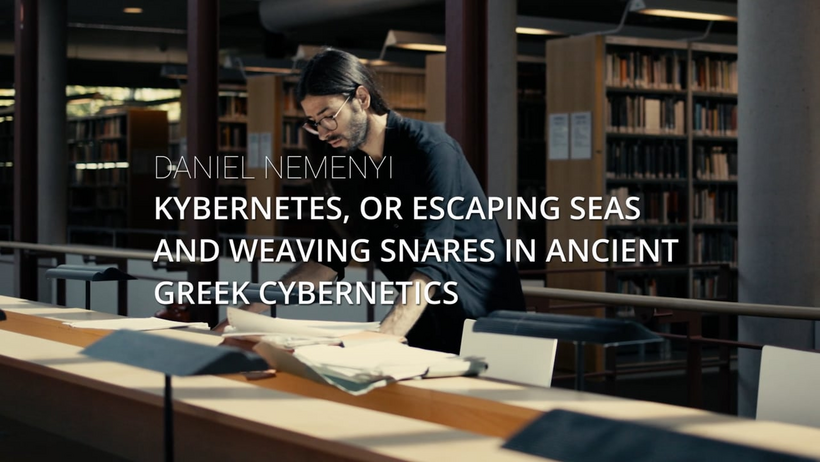Fellow 2023/24
As a philosopher, Daniel Nemenyi examines the history of ideas of self-regulating systems. He develops new perspectives on those concepts and formations that determine contemporary reality. In his current project he takes a deconstructivist reading of the ancient figure of the Kybernetes, the navigator of the ancient Greek ship and positions him against a thinking of control and inevitability. Based on a novel interpretation of the concept of network from cybernetics, structuralism and cyberfeminism, his work contributes to the development of alternatives to engineered and automated solution logics. He is also a member of the editorial collective of the journal Radical Philosophy and of the experimental research project “The Pragmatic Genealogy of Concepts: La toupie folle”, for which he has developed a note box website.
Abstract
Kybernetes, or Escaping Seas and Weaving Snares in Ancient Greek Cybernetics
If our age is defined by cybernetics, what is carried into it from the figure of the ‘Kybernetes’ after which it was named – the helmsman of the ancient Greek ship? This project draws together research on the symbolism and intelligence of the ancient Kybernetes to read modern cybernetics and cyberfeminism with, through and against it. The first part of the project involves synthesising readings by philologists such as Jean-Pierre Vernant who consider the Kybernetes to have been skilled in escaping the trap of the open sea. Such a portrayal of resistance and potency is to be critically deployed against readings of cybernetics as an inevitable science which today dominates modern thought, technology and governmentality (Heidegger, Stiegler, Tiqqun). The second part would bring this synthesis to the cyberfeminist affirmation of entanglement, particularly Donna Haraway’s, wherein networks are not considered traps or snares but the collaborative, symbiotic, ‘sympoietic’ means by which worlds are produced. This research project attempts to lay the foundations for the Kybernetes to be read through non-Greek myths. It aims to support non-European, global, readings of a cybernetically-entangled age.
Education
2019 PhD Philosophy, Centre for Research in Modern European Philosophy (CRMEP), Kingston University
2012 MA Modern European Philosophy (Distinction) CRMEP, Kingston University
2006 BA Philosophy, University of Sussex
Most Recent Academic Position
Postdoctoral Research Assistant in Philosophy: The Pragmatic Genealogy of Concepts, King’s College, London
Lecturer in Big Data Methodologies and Technologies Education at the Department of Digital Humanities, King’s College London
Tutor in Philosophy at the Mary Ward Centre, London
Most Recent Publications
“Robots Makes Free. The Leibnizian cryptowar of Norbert Wiener”, in: Radical Philosophy 2.14 (Spring 2023): 3-20. https://www.radicalphilosophy.com/article/robot-makes-free
“How We Never Became Posthuman. Homeostasis As Conflict from Claude Bernard to Norbert Wiener.” In: “Distributed Perception. Resonances and Axiologies,” edited by Natasha Lushetich and Iain Campbell. London: Routledge, 2021: 160-173. https://www.taylorfrancis.com/chapters/edit/10.4324/9781003157021-13/never-became-posthuman-daniel-nemenyi
“Position Paper: On Alexandre Koyré’s ‘The Political Function of the Modern Lie’”, 2019. http://terracritica.net/publications/


